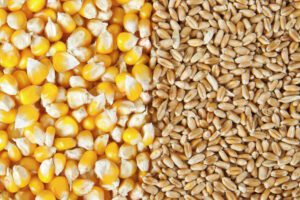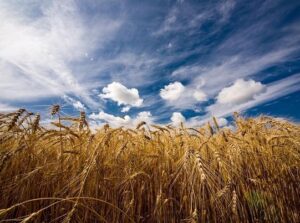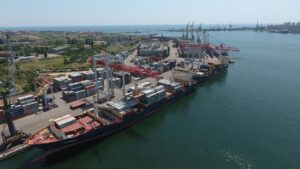
The next four ships with 115 thousand tons of agricultural products left the ports of Chornomorsk and Pivdenny on Wednesday for Africa, Asia and Europe, the Ministry of Infrastructure of Ukraine reports.
“Four ships left the berths, including Magnum Fortune, which transports 51 thousand tons of Ukrainian wheat for Bangladesh, and Almeray with 32.4 thousand tons of corn for Libya,” the agency noted on Facebook.
In total, after the release of the first vessel with Ukrainian food, 5.4 million tons of agricultural products were exported, and the total number of vessels leaving Ukrainian ports for the countries of Asia, Europe and Africa reached 235.
The agency indicated that the day before, the most capacious vessel of the time of the initiative, the Capesize Maran Excellence, with 115,000 tons of grain, left the port of Pivdenny.
As reported, in Istanbul on July 22, with the participation of the UN, Ukraine, Turkey and Russia, two documents were signed on the creation of a corridor for the export of grain from three Ukrainian ports – Chornomorsk, Odessa and Pivdenny.

The next four ships with 88.17 thousand tons of agricultural products left the ports of Odessa and Pivdenny on Friday for the countries of Asia and Europe, the Ministry of Infrastructure of Ukraine reports.
“MAINLAND, NEW FAITH, USICHEM departed from the berths of the port of Odessa. From the port of Pivdenny – KARTERIA,” the agency noted on Facebook.
In general, since the launch of the first vessel with Ukrainian food, taking into account today’s vessels, 4.9 million tons of agricultural products have been exported. In total, 222 ships with agricultural products departed from Ukrainian ports, sent to the countries of Asia, Europe and Africa.
As reported, on July 22 in Istanbul, with the participation of the UN, Ukraine, Turkey and Russia, two documents were signed on the creation of a corridor for the export of grain from three Ukrainian ports – Chornomorsk, Odessa and Pivdenny.

The Joint Coordinating Center (JCC) has authorized the movement of more than 400 vessels during its work within the framework of the Black Sea Grain Initiative, the UN reported.
“As of September 23, the total tonnage of grain and other agricultural products exported from three Ukrainian ports is 4,556,311 tons. In total, 420 ships have been allowed to move at the moment – 217 for arrival in Ukrainian ports and 203 for leaving them,” – the message says.
It is noted that on September 23, 12 ships with more than 200 thousand tons of food left Ukrainian ports after receiving permission from the SKC.
The UN explained that five ships – Zeko Y (8.2 thousand tons of wheat), Olma (5150 tons of soybeans), Merry M (4450 tons of sunflower meal), Gudena (3860 tons of sunflower oil), Nil Demir (3, 7 thousand tons of peas) – went to Turkey.
In addition, the Sea Dove (33 thousand tons of corn) and Lady Ayana (27 thousand tons of corn) ships sailed for Italy, the Fortuna dry cargo ship (10,252 tons of sunflower meal) – for France, the Gem Star ship (31,039 tons of corn) – to the Netherlands.
Dry cargo ship Mo Gan Shan (57,311 tons of wheat) was poisoned in Bangladesh, the ship Mavka (11,950 tons of sunflower oil) – in Romania, Tzarevich (10 thousand tons of sunflower meal) – in Bulgaria.
On July 22, in Istanbul, with the participation of the UN, Ukraine, Turkey and Russia, a document was signed on the creation of a corridor for the export of grain from three Ukrainian ports – Chornomorsk, Odessa and Pivdenny.

Ukraine exported 1.7 million tons of agricultural products from the ports of Odesa, Chornomorsk and Pivdenny in the first month of the grain initiative, the press service of the Ministry of Infrastructure of Ukraine reported on Friday.
According to the release, during August, 68 ships left the unlocked ports, the ports of destination of which are located in 18 countries of the world.
At the same time, 19 vessels departed from the port of “Odesa”, 13 from “Pivdenny”, and the port of “Chornomorsk” sent 36 vessels.
According to the ministry’s announcement, as part of the grain initiative, three times more agricultural products were exported from the ports of Odesa in August than during this month by road transport.
“Only in August, more than 1.7 million tons of food were exported through the ports of Great Odesa. During the same period, almost 1.6 million tons were exported through the Danube ports, about a million tons by rail, and more than 600 thousand tons by road,” commented the Minister of infrastructure of Ukraine Oleksandr Kubrakov.
According to him, in September, it is planned to reach the rate of transshipment through unblocked sea ports at the level of at least 3 million tons of products. At the same time, it is planned to export at least 8 million tons by all modes of transport.
According to the ministry, in August, Odesa Port exported 419,000 tons of agricultural products, Chornomorsk – 848,000 tons, and Pivdenny – 459,000 tons. At the same time, Ukrainian agricultural products went mainly to Asia (726 thousand tons), Europe (640 thousand tons) and Africa (365 thousand tons). Also, 60.8 thousand tons were sent to Ethiopia and Yemen as part of the UN food program.
According to the ministry, 66.9% of exported agricultural products fell on corn, 21.6% – on wheat, 4.8% – on barley and 6.7% on other agricultural crops: sunflower, rapeseed, bran and pulp.
In turn, Kubrakov emphasized that in August, about 5 million tons of agricultural products were exported from the unblocked and Danube ports, by rail and by road. According to him, this is a record figure since the beginning of the full-scale invasion of Russia.
As reported, on July 22 in Istanbul, at the suggestion of the UN, Ukraine, Turkey and UN Secretary General Antonio Guterres signed an initiative on the safe transportation of grain and food products from the Ukrainian ports of Odesa, Chornomorsk and Pivdenny.
AGRICULTURAL PRODUCTS, EXPORTED, Grain initiative, ODESA, PORTS

The total tonnage of grain and other food products exported from three Ukrainian ports as part of the Black Sea Grain Initiative reached 1 million 766.53 thousand tons on September 2, the Joint Coordination Center (JCC) reported.
“A total of 160 flights are allowed: 86 inbound and 74 outbound,” his summary emphasizes.
In particular, on September 2, the SCC authorized the movement of eight vessels carrying a total of 196.29 thousand tons of agricultural products on Saturday.
Among them from the “Southern” port: MAINA in Tarragona (Spain) with 56.5 thousand tons of corn, CANOPUS in Jawaharlal Nehru (India) with 42 thousand tons of sunflower oil, SEA DOLPHIN in Amsterdam (Netherlands) with 31.1 thousand tons, LADY PERLA in Porto Marghera (Italy) with 20.5 thousand tons of corn.
From the port of “Chornomorsk”: BC CALLISTO to Damietta (Egypt) with 31.4 thousand tons of wheat, LADY EVA in Patras (Greece) with 6.12 thousand tons of wheat, SEALOCK to Mersin (Turkey) with 2.07 thousand tons. tons tons of peas, as well as SARA from Odesa to Tekirdag (Turkey) with 6.6 thousand tons.
Two more vessels whose planned departure on Friday was postponed are also expected to depart on Saturday-Sunday: MUBARIZ IBRAHIMOV from Odesa to Tekirdag (Turkey) with 6.6 thousand tons of sunflower oil and NORD VIRGO from “Pivdenny” to Juan (China) ) from 62.34 thousand tons of corn.
In addition, the SCC completed eight inspections of inbound vessels on September 2, and has nine inspections planned for Saturday: six inbound vessels and three outbound.
As reported, on July 22 in Istanbul, at the suggestion of the UN, Ukraine, Turkey and UN Secretary General Antonio Guterres signed an initiative on the safe transportation of grain and food products from the Ukrainian ports of Odesa, Chornomorsk and Pivdenny.

Six ships (SEAJOY, LADY ZEHMA, SAFFET AGA, SIMAS, MICHALLIS and KARTERIA) departed from the seaports of Odessa, Chornomorsk and Pivdenny with 183,000 tons of Ukrainian agricultural products.
As reported on the official page of the Ministry of Infrastructure of Ukraine on Facebook, among them is the vessel KARTERIA, chartered by the UN World Food Program to help the population of Yemen.
“In less than a month of the initiative’s operation, we have exported almost one and a half million tons of agricultural products, and this is a fairly significant result. However, we must reach 100-150 ships per month and with a total throughput of 5 million tons per month from the three ports of Greater Odessa,” the message is quoted as saying. Minister of Infrastructure Alexander Kubrakov.
He also noted that Ukraine is strengthening the humanitarian part of the initiative – on board the bulk carrier KARTERIA there are 37.5 thousand tons of wheat for Yemen, which is in a state of humanitarian catastrophe. There, according to the UN, 16 million people suffer from hunger.
“We understand our global mission and responsibility to countries that need Ukrainian food. The caravan that left today is Ukraine’s next step towards the civilized world,” the minister commented.
According to the Ministry of Infrastructure, during the implementation of the Initiative for the Safe Transportation of Agricultural Products, 61 ships have already departed from Ukrainian ports. There are about 1.5 million tons of agricultural products on board.